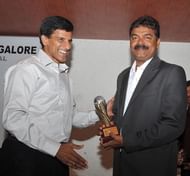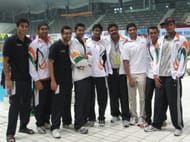Since 1987, the year when coach Pradeep S Kumar took over as the head coach of Basavangudi Aquatic Club, much has changed for Indian swimming. Coming from a small village called Pacha Palode near Thiruvananthapuram, Kerala, Pradeep, in his 25 years of coaching at the Basavangudu Aquatic Centre, has produced former greats like Abhijeet J, Sajini Shetty, Abhinaya Shetty, Nisha Millet, Reshma Millet and current champions Rehan Poncha, Aaron D’Souza, Saurabh Sangavekar, to name a few.
Pradeep Kumar is behind the transformation of Indian swimming since he took over as the national head coach six years ago. Since the 90s, BAC has established it’s self as the premier training centre for swimming in the country. Swimmers from across the nation to work under the tutelage of Pradeep S Kumar.
In a free willing chat, Pradeep talks about his journey from Pacha, to life after swimming and his decision of hanging up his boots as a national coach. Excerpts:
What was it like when you first took over as the head coach of Basavangudi Aquatic Club?
l took over as the head coach from Gopal Rao. Back then, BAC had just a handful of swimmers. It took us a while to win the first national medal. It was won by a girl called Ramya B. Abhijith J was the first to break a national record at the SAF Games in the 1500m freestyle. Back then, when we thought of the timing our swimmers are clocking today, it almost felt impossible. We were 40 years behind international standards. It’s quite remarkable for us to have achieved what we have today.

Vimal Kumar, former national coach badminton, presenting the ‘coach of the year’ award to national swimming coach Pradeep Kumar during the Sports Writers Association Bangalore award ceremony last year.
What was the scenario when you took over as the national head coach?
Indian swimming has always had a good base, but whether we were using best methods to train is questionable. Thanks to CWG funding, swimmers have got better international exposure in the last couple of years. Earlier, we used to get just one or two international competitions. But with the Asian Games and Commonwealth Games in 2010, the funding got better. Our travel schedule was so cut up that the swimmers had no time to rest.
How challenging have these six years been for you?
Initially, it was okay because we were building the team, but later on it became challenging because performances mattered a lot. I am enjoying the challenge.
As a coach, what was your defining moment?
I think Rehan qualifying for the Beijing Olympics was my happiest moment as a coach. It was a great achievement not only for him but for me as a coach, because even when Nisha qualified for Sydney Olympics I was not directly involved as she was training abroad. Rehan believed in my training and decided to stay on and train with me. I would have failed as a coach if I could not have helped him qualify.
Another happy moment was when the swimming pool in my village was completed. It feels great to see it functioning in full spirit.
According to you, what can be done to boost the domestic circuit?
Domestic competitions should be on par with the international meets. Having an atmosphere which matches the international standards makes a lot of difference. For that, our concept of nationals should change. One should not conduct a national meet for the sake of it. With our standards reaching international level, we cannot have a national competition in venues which does not have good infrastructure. If you don’t want top swimmers to miss domestic competitions, we should organise the meet in a better fashion.
The women’s team hasn’t been doing too well. Do you think Indian women’s team has suffered a gap after Shikha Tandon moved to USA?
There is a gap, but one thing I want people to notice is that there are three swimmers who are clocking below one minute in the 100m freestyle and 0.27 seconds in 50m freestyle, which has never happened in Indian history. And these girls are in their teens, whereas Nisha and Shikha were almost close to 20 years of age when they clocked that time. So I think this gap will not remain for long.
Have you been able to live up to your expectations?
As a coach, I think I have succeeded, but one area in which I think I have failed my expectations is as a father or a husband. I could not give enough time for them. It is something I know but I will never accept in front of them. (Smiles)
Tell us about your struggle to make it to this level…
I am from a lower middle class family, and early days of my life were a real struggle. Ours was a remote village and to even get a day’s meal was not easy for my parents. To have a better shoe or a shirt was a luxury. Even after my degree, when I joined NIS (National Institute of Sports), paying up the fees was tough. I am blessed with a comfortable life now, but I will never forget those days of my life.
Have you ever thought of a life after swimming?
Yes, I have been doing some thinking. I completed 25 years of coaching in BAC last year. I’d like to take to a different life because I have nothing else to prove to anyone. I would like to spend some time with my family and probably do a different kind of coaching, and not training professional swimmers. Maybe work with swimmers with a disability… Let’s see…

